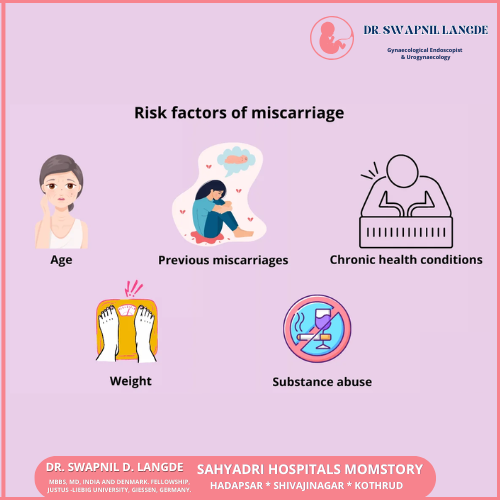Experiencing a miscarriage can be emotionally devastating. When it happens more than once, the emotional and physical toll deepens. Recurrent miscarriage, defined as two or more consecutive pregnancy losses, affects about 1-2% of women. If you’re facing this painful challenge, you’re not alone — and there is hope. According to renowned gynecologist Dr. Swapnil Langde, understanding the root causes is the first step towards finding a solution and achieving a successful pregnancy.
What is Recurrent Miscarriage?
Recurrent miscarriage (also called recurrent pregnancy loss) is the loss of two or more pregnancies before the 20th week of gestation. These losses may occur consecutively or with successful pregnancies in between.
Common Causes of Recurrent Miscarriage
1. Genetic Abnormalities
Chromosomal abnormalities in either parent can lead to repeated pregnancy losses. In many cases, one partner may carry a balanced translocation, which doesn’t affect their health but may cause miscarriage.
2. Uterine Abnormalities
Structural issues like a septate uterus, fibroids, or intrauterine adhesions can interfere with embryo implantation and development.
3. Hormonal Imbalances
Conditions like uncontrolled diabetes, thyroid disorders, polycystic ovary syndrome (PCOS), and luteal phase defects can contribute to miscarriage risk.
4. Autoimmune Disorders
Antiphospholipid syndrome (APS) and other autoimmune conditions can cause clotting problems in the placenta, cutting off vital nutrients and oxygen to the fetus.
5. Blood Clotting Disorders (Thrombophilias)
Certain inherited clotting conditions can increase the risk of pregnancy loss due to restricted blood flow to the placenta.
6. Infections
While not commonly the cause of repeated miscarriages, some untreated infections such as bacterial vaginosis or listeria can pose a risk during early pregnancy.
7. Lifestyle and Environmental Factors
Smoking, excessive alcohol use, obesity, exposure to toxins, and high levels of stress can increase miscarriage risk. A healthy lifestyle is essential for a healthy pregnancy.
8. Age-related Factors
The risk of miscarriage increases with maternal age, especially after 35. Age-related decline in egg quality can lead to chromosomal abnormalities in the embryo.
Diagnosis and Evaluation
Dr. Swapnil Langde emphasizes the importance of thorough evaluation after recurrent pregnancy loss. Diagnostic tests may include:
-
Karyotyping of both partners
-
Ultrasound or hysteroscopy to evaluate uterine structure
-
Hormonal and thyroid assessments
-
Autoimmune and clotting disorder screening
-
Infection screening
Hope Through Personalized Treatment
The good news is that with appropriate diagnosis and targeted treatment, many couples go on to have successful pregnancies. Whether through surgical correction, hormonal support, lifestyle changes, or fertility treatments, solutions exist.
Dr. Swapnil Langde offers compassionate, individualized care, helping couples navigate the path to parenthood with advanced diagnostic tools and evidence-based treatment options.
Conclusion
Recurrent miscarriage is a heartbreaking experience, but understanding the causes brings clarity and direction. With expert care from specialists like Dr. Swapnil Langde, many couples overcome these challenges and achieve their dream of becoming parents.

